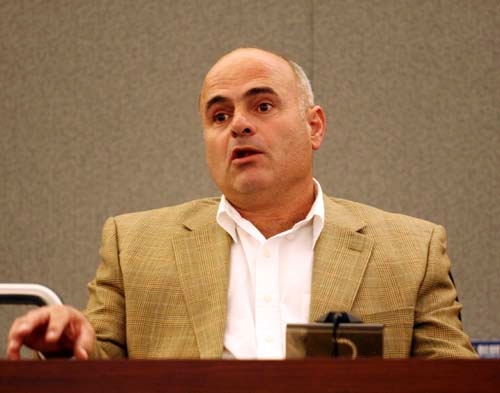High-roller convicted of passing $384,000 in bad checks at casinos

California businessman Harel Zahavi insisted on the witness stand this week that he never intended to defraud four Las Vegas casinos out of $384,000 in gambling markers.
But his testimony, with a passionate closing argument from his defense lawyer, Richard Wright, failed to stop a jury on Wednesday from convicting him of four felony counts of passing bad checks at the casinos.
District Judge Valerie Adair set an Oct. 27 sentencing for Zahavi, who faces one to four years in prison and a maximum $5,000 fine on each count.
An indictment returned in December alleged that the Israeli-born Zahavi didn’t pay back $133,000 in markers at The Venetian, $51,000 at the Palazzo, $100,000 at the Hard Rock and $100,000 at Caesars Palace. The credit was extended from October through December 2008.
Wright told jurors Tuesday that the $384,000 in debts were minuscule compared to Zahavi’s decade of gambling roughly $50 million at local casinos, including The Venetian, where records show he had put $8.3 million in play at the tables.
Wright accused the four casinos of predatory-like conduct in handing out the credit to Zahavi as his financial world was collapsing.
Zahavi, 50, who once ran a thriving ice cream business in Southern California, estimated that he lost $3 million during his years of gambling. He testified that he liked to play roulette and baccarat.
In his closing argument, Chief Deputy District Attorney Bernie Zadrowski asked the jurors to stay focused on the charges, arguing, “The casinos are not on trial here.”
Zadrowski said the evidence prosecutors presented during the weeklong trial clearly showed that Zahavi intended to defraud the four casinos. He described Zahavi as a man who was “on his way down and reaching the end of his rope.”
Gambling debts are prosecuted under Nevada law as bad check cases.
Zadrowski on Wednesday said the verdict sent a “message from the community that this kind of criminal activity will not be tolerated.”
“It means that people cannot welch on casino markers,” he said.
Wright had to leave town and was not present for the verdict, but his partner Margaret Stanish said afterward the verdict would be appealed to the Nevada Supreme Court.
“We hope that the Supreme Court will seriously consider and evaluate how casinos abuse the system and realize that the constitutional prohibition against debtor prison needs to prevail over the casinos’ profit margin,” Stanish said. Zadrowski, however, didn’t share that opinion.
“We don’t put people in jail for failing to pay debts,” he said. “We put people in jail for committing crimes, and that’s what this case was all about.”
Wright told the jurors that Zahavi and his family — not the four casinos — were the victims in this case.
Through a sophisticated credit service, the casinos knew more about Zahavi’s failing finances in 2008 than Zahavi and gave him markers knowing he couldn’t repay them, Wright argued.
The casinos, he charged, also ignored Zahavi’s gambling addiction in their zeal to extend him credit.
Zahavi testified that he started out gambling with cash, about $500 a week, in the 1990s and by 2008 was getting $100,000 in credit lines at some casinos. He described himself as a “very low maintenance” high roller who always made efforts to pay back his markers, even if it meant mortgaging his home and business.
Zahavi said he never thought that he would end up being charged as “the worst criminal” because of his gambling habit. He thought the casinos would pursue the money in civil court.
Because he doesn’t read or write well in English, Zahavi testified, he never read the fine print of the markers informing him that the casinos could seek criminal charges against him if he failed to redeem the markers.
He said he landed in trouble in September 2008 when he continued to gamble after he had refinanced his ice cream business to pay off roughly $700,000 in casino debts around town.
With his losses cleared, The Venetian and Palazzo increased his credit lines, which contributed to a new round of gambling debts for Zahavi, testimony showed.
A Hard Rock executive testified that the resort gave Zahavi $100,000 in markers in late October 2008 knowing that by then, he had accumulated nearly $500,000 in outstanding markers at other casinos and had less than $30,000 in the two bank accounts he listed.
Caesars Palace gave Zahavi $100,000 in markers in December 2008 after he told the casino he was “dead broke” and owed other properties, testimony showed.
Contact Jeff German at jgerman@reviewjournal.com or 702-380-8135.


















